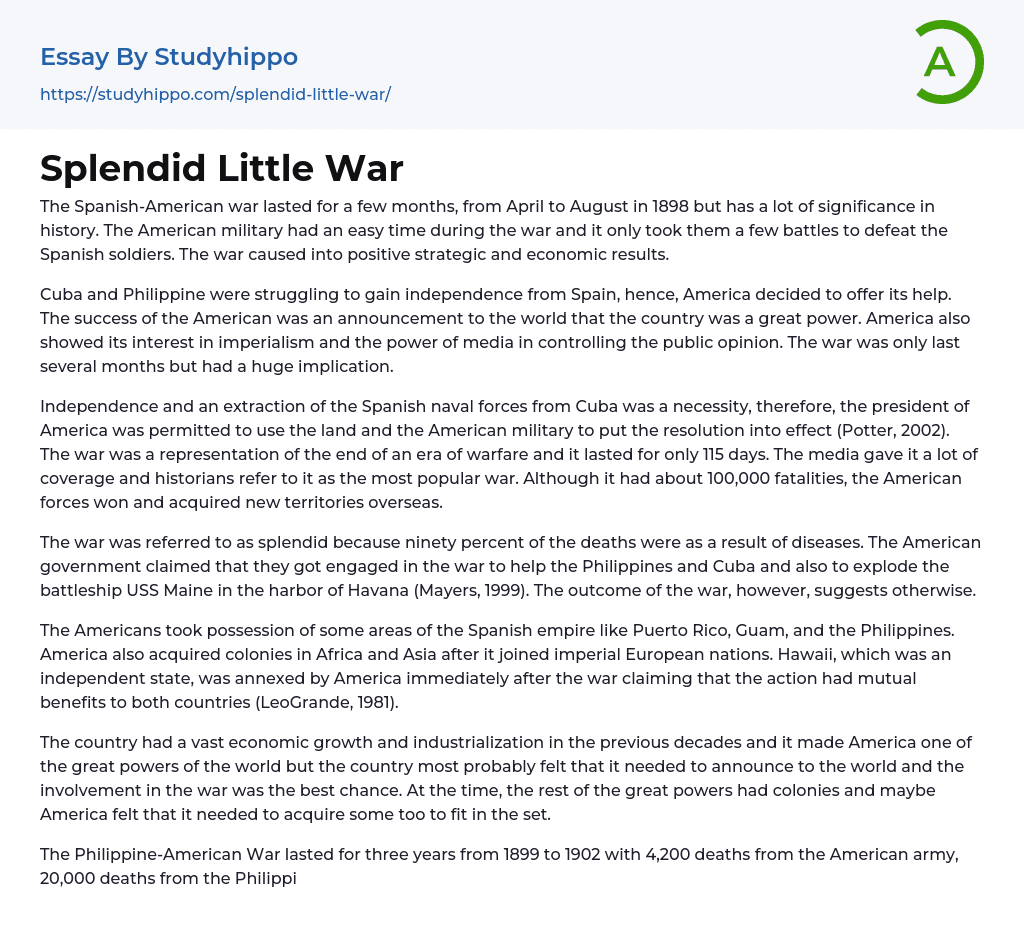The Spanish-American war lasted for a few months, from April to August in 1898 but has a lot of significance in history. The American military had an easy time during the war and it only took them a few battles to defeat the Spanish soldiers. The war caused into positive strategic and economic results.
Cuba and Philippine were struggling to gain independence from Spain, hence, America decided to offer its help. The success of the American was an announcement to the world that the country was a great power. America also showed its interest in imperialism and the power of media in controlling the public opinion. The war was only last several months but had a huge implication.
Independence and an extraction of the Spanish naval forces from Cuba was a necessity, therefore, the president of Americ
...a was permitted to use the land and the American military to put the resolution into effect (Potter, 2002). The war was a representation of the end of an era of warfare and it lasted for only 115 days. The media gave it a lot of coverage and historians refer to it as the most popular war. Although it had about 100,000 fatalities, the American forces won and acquired new territories overseas.
The war was referred to as splendid because ninety percent of the deaths were as a result of diseases. The American government claimed that they got engaged in the war to help the Philippines and Cuba and also to explode the battleship USS Maine in the harbor of Havana (Mayers, 1999). The outcome of the war, however, suggests otherwise.
The Americans took possession of some areas of the Spanish empire lik
Puerto Rico, Guam, and the Philippines. America also acquired colonies in Africa and Asia after it joined imperial European nations. Hawaii, which was an independent state, was annexed by America immediately after the war claiming that the action had mutual benefits to both countries (LeoGrande, 1981).
The country had a vast economic growth and industrialization in the previous decades and it made America one of the great powers of the world but the country most probably felt that it needed to announce to the world and the involvement in the war was the best chance. At the time, the rest of the great powers had colonies and maybe America felt that it needed to acquire some too to fit in the set.
The Philippine-American War lasted for three years from 1899 to 1902 with 4,200 deaths from the American army, 20,000 deaths from the Philippines combats and about 200,000 civilian deaths as a result of violence, famine, and diseases (Linn, 2000). The Americans claimed that the Philippines could not rule themselves but the Philippines resisted, hence, they annexed the country which gives rise to into the war.
The war is largely ignored in history probably because the president of America at the time, Roosevelt, also ignored it since it was painful to him and the Americans in general. The war was also as a result of the resistance from Philippine and it ruins the image of America. The Americans had to ignore the war since the main reason for their involvement in the Spanish-American war would be revealed.
In chapter 21, section one, the Americans are depicted as having a lot of enthusiasm and there were a lot of
volunteers. Ninety percent of the deaths were as a result of tropical diseases rather than violence. The chapter talks about the economic and political changes that arose in the country in section two of chapter 21. The Spanish-American war was little and short and was meant to be helpful to the Cuba and Philippine people. However, the results of the war which were splendid give a different view of the initial intentions of the Americans.
References
- LeoGrande, W. M. (1981). A Splendid Little War: Drawing the Line in El Salvador. International Security, 6(1), 27-52.
- Linn, B. M. (2000). The Philippine War, 1899-1902. University Press of Kansas.
- Mayers, D. (1999). Splendid Little War. In Wars and Peace (pp. 23-37). Palgrave Macmillan US.
- Potter, L. A. (2002). OurDocuments.gov.(Teaching with Documents). Social Education, 66(7), 390-400.
- World War I essays
- World War Ii essays
- Atomic Bomb essays
- American Civil War essays
- Attack essays
- Cold War essays
- Crimean War essays
- Emilio Aguinaldo essays
- Iraq War essays
- Korean War essays
- Nazism essays
- Nuclear Weapon essays
- Philippine Revolution essays
- Trench Warfare essays
- Vietnam War essays
- Western Front essays
- Diplomacy essays
- Emperor essays
- Rwanda essays
- Tribe essays
- Revolutionary War essays
- War of 1812 essays
- Mexican American War essays
- Hitler essays
- The Spanish American War essays
- League Of Nations essays
- Battle Of The Somme essays
- Treaty Of Versailles essays
- Fascism essays
- D-day essays
- Atomic Physics essays
- Atomic Bombings Of Hiroshima And Nagasaki essays
- Electron essays
- Cuba essays
- Haiti essays
- Jamaica essays
- Puerto Rico essays
- 1920S essays
- 1950S essays
- 1960S essays
- 19Th Century essays
- 20Th Century essays
- Ancient Greece essays
- Bravery essays
- British Empire essays
- Civilization essays
- Colonialism essays
- Declaration of Independence essays
- Evidence essays
- Genocide essays




